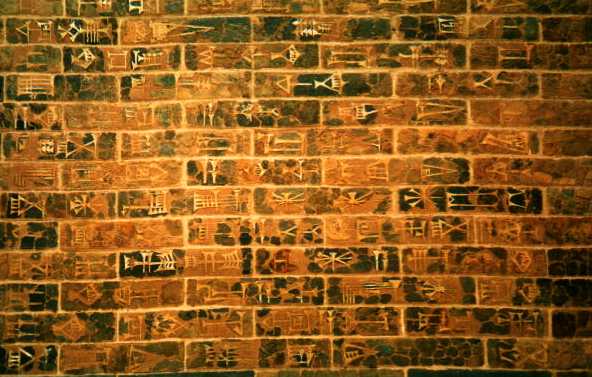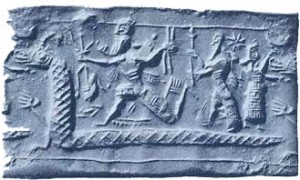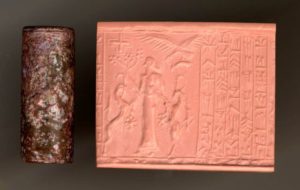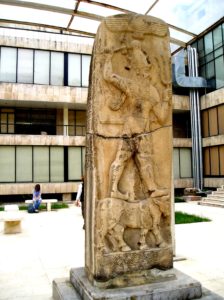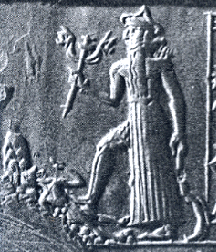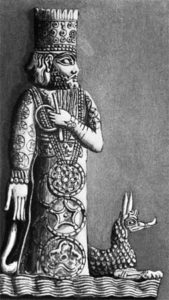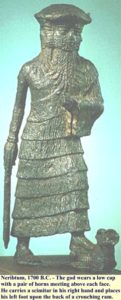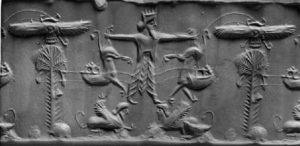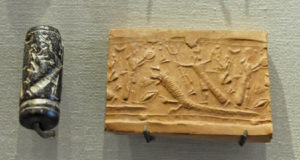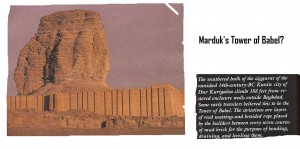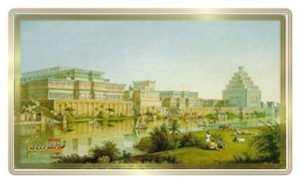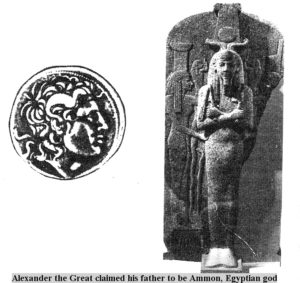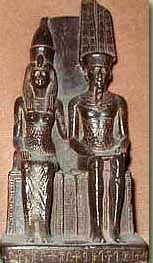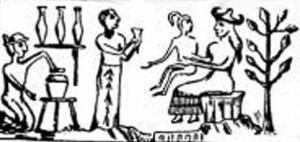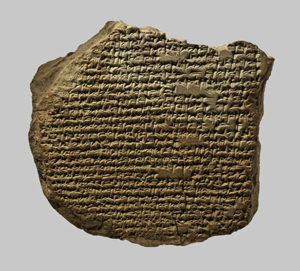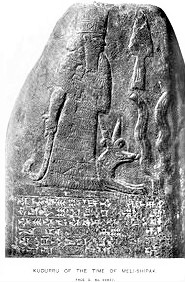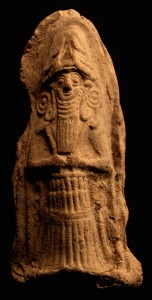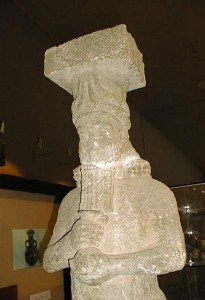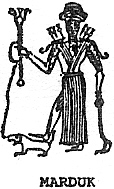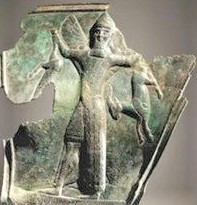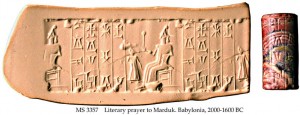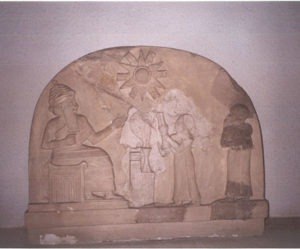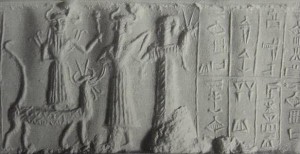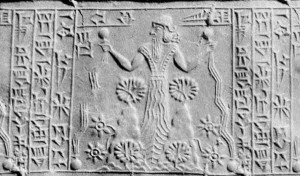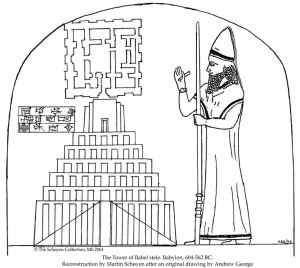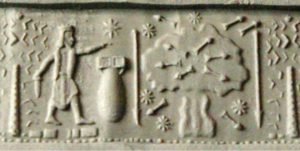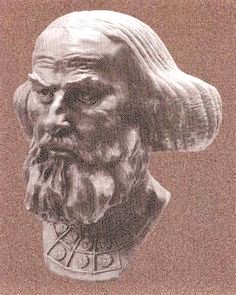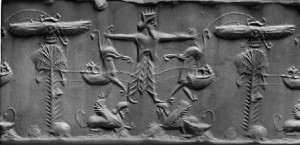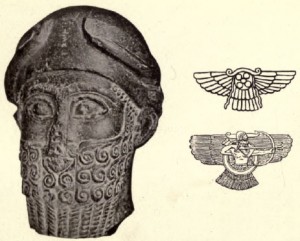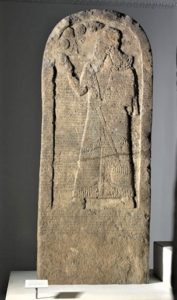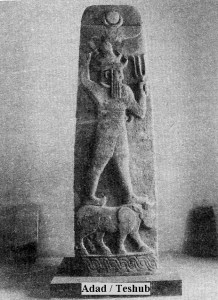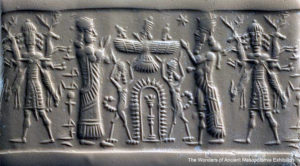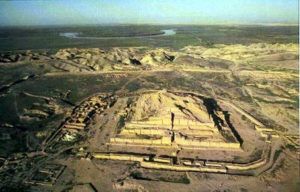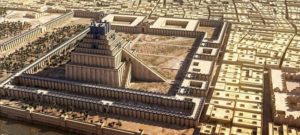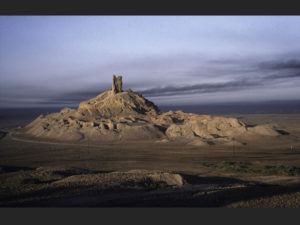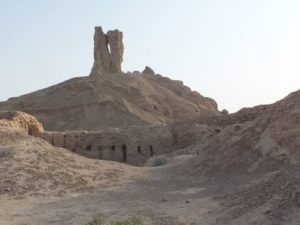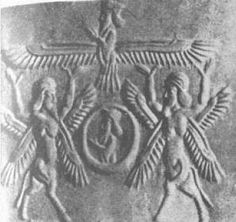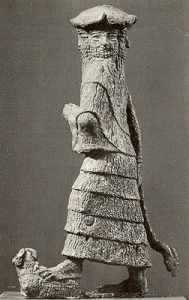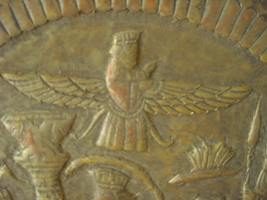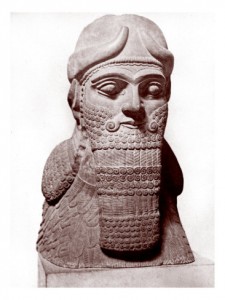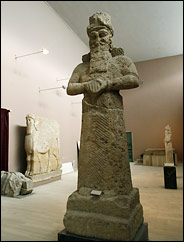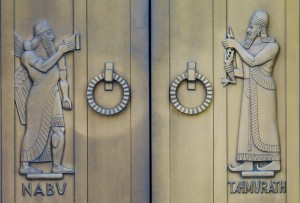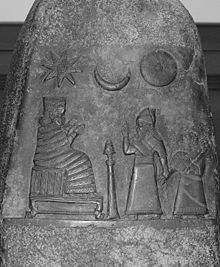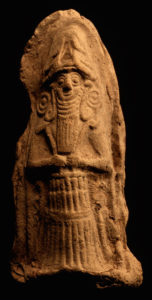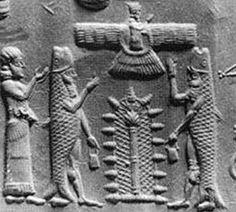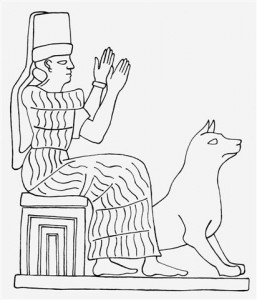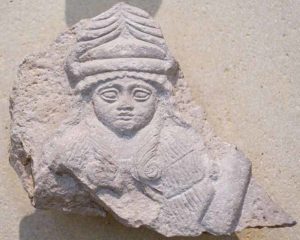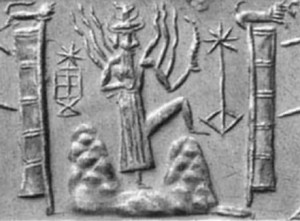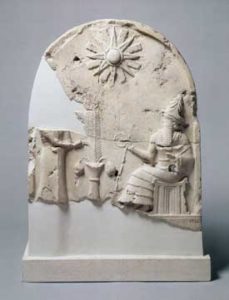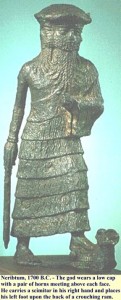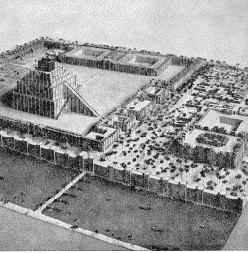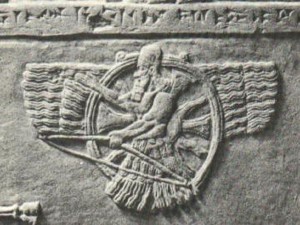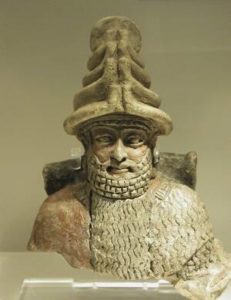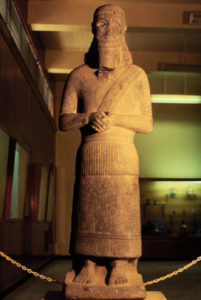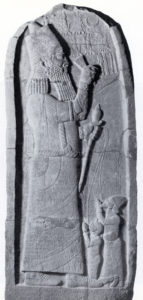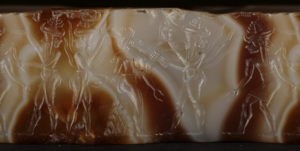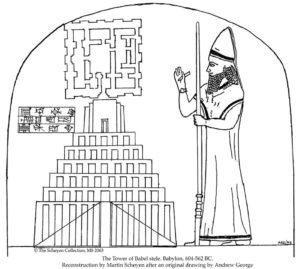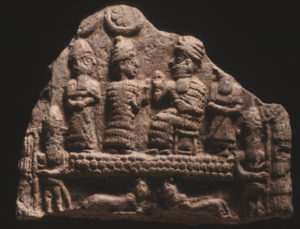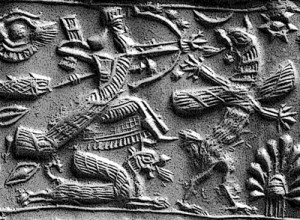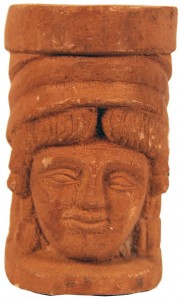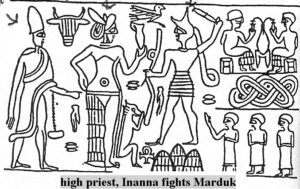Published: Pleyte and Rossi, Papyrus de Turin, pls. 31, 77, 131-138.
Translated: Wiedemann, Religion of the Ancient Egyptians, p. 54.
This tale is found in a hieratic papyrus of the xxth dynasty (about 1200-1100 B.C.). It is written on both sides; the handwriting on one side differs from the handwriting on the other, showing that it is the work of two scribes. The writing is in black ink with occasional sentences in red. Hieratic is the running hand, derived from the hieroglyphs; the earliest example occurs in the first dynasty; it was superseded by demotic in the latest period of Egyptian history.
This papyrus is not quite complete, but the part containing the legend is fortunately uninjured. The text consists of magical formula against the bites of serpents. In healing by magic, the magician recited an event in the career of some deity in which the god suffered from the same malady as the human patient then seeking relief. The words which cured the divine patient would also cure the human invalid. The same idea prevails in the legend of the Scorpions of Isis.
(Texts: All Artifacts, Color Coding, & Writings in Bold Type With Italics Inside Parenthesis, are Added by Editor R. Brown, not the Authors, Translators, or Publishers!)
(gods in blue)
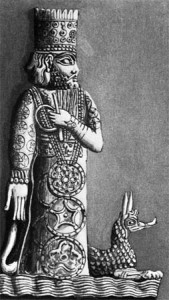
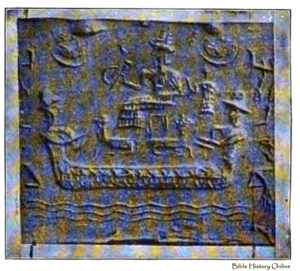 (Marduk, Enki‘s eldest son, angrily believed enlil usurped enki‘s birth-rite of kingship, leaving marduk‘s birth-rite forgotten)
(Marduk, Enki‘s eldest son, angrily believed enlil usurped enki‘s birth-rite of kingship, leaving marduk‘s birth-rite forgotten)
Now the Majesty of Ra (Marduk) was the creator of heaven and earth,
of gods, men, and cattle, of fire, and the breath of life; and he ruled over gods and men.
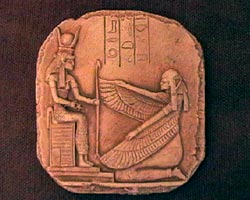 (Isis, spouse to Ashur / Asar / Osiris)
(Isis, spouse to Ashur / Asar / Osiris)
And Isis (Marduk‘s daughter-in-law) saw his might, the might that reached over heaven and earth,
before which all gods and men bowed; and she longed in her heart for that power,
that thereby she should be greater than the gods and have dominion over men.
There was but one way to obtain that power.
By the knowledge of his own name did Ra (Marduk) rule, and none but himself knew that secret name.
Whosoever could learn the secret, to that one—god or man—would belong the dominion over all the world,
and even Ra himself must be in subjection.
Jealously did Ra guard his secret, and kept it ever in his breast,
lest it should be taken from him, and his power diminished.
Every morning Ra (Sun disc symbol) came forth in his glory at the head of his train from the horizon of the East,
journeying across the sky, and in the evening they came to the horizon of the West,
and the Majesty of Ra sank in his glory to lighten the thick darkness of the Duat.
Many, many times had Ra made the journey, so many times that now he had waxed old.
Very aged was Ra, and the saliva ran down from his mouth and fell upon the earth.
Then Isis took earth and mixed it with the saliva,
and she kneaded the clay and molded it, and formed it into the shape of a snake,
the shape of the great hooded snake that is the emblem of all goddesses,
the royal serpent which is upon the brow of the Kings of Egypt.
No charms or magic spells did she use, for in the snake was the divine substance of Ra himself.
She took the snake and laid it hidden in the path of Ra,
the path on which he traveled in journeying from the eastern to the western horizon of heaven.
In the morning came Ra and his train in their glory journeying to the western horizon of heaven,
where they enter the Duat and lighten the thick darkness.
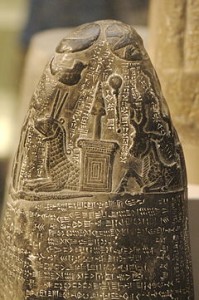 (boundary stone with symbols of gods, giving protection by the gods)
(boundary stone with symbols of gods, giving protection by the gods)
And the serpent shot out its pointed head which was shaped like a dart, and its fangs sank into the flesh of Ra,
and the fire of its poison entered into the God, for the divine substance was in the serpent.
Ra cried aloud, and his cry rang through the heavens from the eastern to the western horizon;
across the earth it rang, and gods and men alike heard the cry of Ra.
And the gods who follow in his train said to him, “What aileth thee? What aileth thee?”
But Ra answered never a word, he trembled in all his limbs, and his teeth chattered, and naught did he say,
for the poison spread over his body as Hapi spreads over the land,
when the waters rise above their banks at the time of the overflowing of the river.
When he had become calm, he called to those who followed him and said,
“Come to me, ye whom I created. I am hurt by a grievous thing.
I feel it, though I see it not, neither is it the creation of my hands, and I know not who has made it.
Never, never have I felt pain like this, never, never has there been an injury worse than this.
Who can hurt me? For none know my secret name, that name which was spoken by my father and by my mother,
and hidden in me that none might work witchcraft upon me.
I came forth to look upon the world which I had made,
I passed across the Two Lands when something—I know not what—struck me.
Is it fire? Is it water? I burn, I shiver, I tremble in all my limbs.
Call to me the children of the gods, they who have skill in healing,
they who have knowledge of magic, they whose power reaches to heaven.”
Then came all the gods with weeping and mourning and lamentations;
their power was of no avail against the serpent, for in it the divine substance was incorporated.
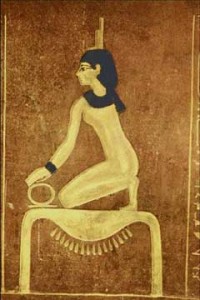 (Isis, spouse to Marduk‘s son Ashur / Osiris, goddess of Egypt)
(Isis, spouse to Marduk‘s son Ashur / Osiris, goddess of Egypt)
With them came Isis the Healer, the Mistress of Magic, in whose mouth is the Breath of Life,
whose words destroy disease and awake the dead.
She spoke to the Majesty of Ra and said.
“What is this, O divine Father? what is this? Has a snake brought pain to thee?
Has the creation of thy hand lifted up its head against thee?
Lo, it shall be overthrown by the might of my magic, I will drive it out by means of thy glory.”
Then the Majesty of Ra answered, “I passed along the appointed path,
I crossed over the Two Lands, when a serpent that I saw not struck me with its fangs.
Was it fire? Was it water? I am colder than water, I am hotter than fire, I tremble in all my limbs,
and the sweat runs down my face as down the faces of men in the fierce heat of summer.”
And Isis spoke again, and her voice was low and soothing,
“Tell me thy Name, O divine Father, thy true Name, thy secret Name, for he only can live who is called by his name.”
Then the Majesty of Ra answered, “I am the Maker of heaven and earth, I am the Establisher of the mountains,
I am the Creator of the waters, I am the Maker of the secrets of the two Horizons,
I am Light and I am Darkness, I am the Maker of Hours, the Creator of Days,
I am the Opener of Festivals, I am the Maker of running streams, I am the Creator of living flame.
I am Khepera in the morning, Ra at noontide, and Atmu in the evening.”
But Isis held her peace; never a word did she speak, for she knew that Ra had told her the names that all men know;
his true Name, his secret Name, was still hidden in his breast.
And the power of the poison increased, and ran through his veins like burning flame.
After a silence she spoke again.
“Thy Name, thy true Name, thy secret Name, was not among those.
Tell me thy Name that the poison may be driven out,
for only he whose name I know can be healed by the might of my magic.”
And the power of the poison increased, and the pain was as the pain of living fire.
Then the Majesty of Ra cried out and said,
“Let Isis come with me, and let my Name pass from my breast to her breast.”
And he hid himself from the gods that followed in his train.
Empty was the Boat of the Sun (Marduk‘s sky-disc), empty was the great throne of the God,
for Ra had hidden himself from his Followers and from the creations of his hands.
When the Name came forth from the heart of Ra to pass to the heart of Isis, the goddess spoke to Ra and said,
“Bind thyself with an oath, O Ra, that thou wilt give thy two eyes unto Horus.”
Now the two Eyes of Ra are the sun and the moon, and men call them the Eyes of Horus to this day.
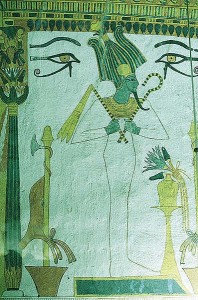 (Ashur / Osiris with eyes of Horus in Egypt)
(Ashur / Osiris with eyes of Horus in Egypt)
Thus was the Name of Ra taken from him and given to Isis, and she, the great Enchantress,
cried aloud the Word of Power, and the poison obeyed, and Ra was healed by the might of his Name.
And Isis, the great One, Mistress of the Gods, Mistress of magic, she is the skilful Healer,
in her mouth is the Breath of Life, by her words she destroys pain, and by her power she awakes the dead.
XI
THE REGIONS OF NIGHT AND THICK DARKNESS
When the world came into being, there were two rivers, the river of Egypt and the river of the sky.
Great is the Nile, the river of Egypt, rising in his two caverns in the South beyond the cataract,
flooding the land of Egypt and bringing joy and good harvests to Ta-mery.
Great and mighty is the river of the sky, flowing across the heavens and through the Duat,
the world of night and of thick darkness, and on that river floats the Boat of Ra (alien sky-disc).
Boat of Millions of Years is its name, but men call it the Manzet Boat in the dawn,
when Ra rises in splendor on the eastern horizon of heaven; the Mesektet Boat is it called in the evening,
when Ra enters in glory within the portals of the Duat, where the mountain of Manu lifts its peaks to the western sky.
On the western horizon is the mountain of Manu. and on the eastern horizon the mountain of Bakhu;
vast and huge are they, raising their crests above the earth, and the sky rests upon their summits.
And on the topmost peak of the mountain of Bakhu dwells a serpent;
thirty cubits in length is he, and his scales are of flint and of glittering metal.
He guards the mountain and the Great Green Waters, and none can pass by him save Ra in his Boat.
In the evening Ra descends in majesty to the Western horizon of heaven, to the portals of the Duat at the Gap of Abydos.
Splendid is the Mesektet Boat, glorious its trappings,
and its colors are of amethyst and emerald, jasper and turquoise, lazuli and the luster of gold.
At the Gap of Abydos waits a company of gods to prepare the Boat for the journey through the Duat,
the land of night and of thick darkness.
Stripped is the Boat of its splendor, bare and without glory is it when it passes through the portals of the Duat,
and in it is the body of Ra, lifeless and dead.
Then the gods take the great towing-ropes; slowly the Boat moves along the river.
The portals of the Duat are flung wide, and the twelve goddesses of the night
take their place upon the Boat to guide it through the gloom and perils of the Duat;
pilots of the river are they, and without them not Ra himself could pass through unscathed.
“Watercourse of Ra” is the name of the first country of the Duat.
Sombre is this land, yet not wholly dark; for on either side the river are six serpents,
coiled and with heads erect, and the breath of their mouths is a flame of fire.
In the cabin of the Boat is Ra, dead and lifeless;
in the prow are Up-uaut, the Opener of the Ways, and Sa, and the goddess of the hour.
Round about the cabin are a company of gods;
these are they who guard Ra from all perils and dangers, and from the attack of the abominable Apep.
Slowly goes the Boat of Ra, passing through the Duat, to regions of thick darkness,
of horror and dismay, where the dead have their habitations, and Apep lies in wait for the coming of Ra.
Thus passes the first hour of the night, and the second hour is at hand.
At the entrance of every country of the Duat is a gate; tall are the walls, and narrow is the passage;
upon the walls are spearheads, sharp and pointed, that no man may climb over.
The door of the gate is of wood, turning on a pivot, and a monstrous snake guards the door.
None may pass by him save those only to whom his name is known.
At the turn of the passage are two great hooded snakes, the one above, the other below.
The breath of their mouths is fire and poison mingled;
through the narrow portal on every side they send forth streams of flame and venom.
At either end of the passage stands a warder, keeping watch.
Then the goddess of the first hour makes way for the goddess of the second hour,
and she calls aloud the name of the Guardian of the gate.
Flung wide are the portals, the fire and poison cease, and the Boat of Ra passes through.
“Ur-nes” do we name this second country of the Duat,
but the Hanebu and those who inhabit the isles of the Great Green Waters call it Ouranos.
The river is wide and bears on its dark waters four shallops;
no oars have they, neither masts nor rudders, but float upon the stream and are carried by the current.
Mysterious and strange are they, and the shadowy shapes which fill them have forms like the forms of men.
In this country Ra is Lord and King, and those who live here are in peace,
for none can pass the great hooded snakes who guard the gates, whose breath is mingled flame and venom.
Happy are those who inhabit this land, for here dwell the spirits of the corn, Besa and Nepra and Tepu-yn.
These are they who make the wheat and barley to flourish and cause the fruits of the earth to increase.
Slowly goes the Boat of Ra, passing through the Duat, through regions of thick darkness, of horror and dismay,
where the dead have their habitation, and Apep lies in wait for the coming of Ra.
Thus passes the second hour of the night, and the third hour is at hand.
Then the goddess of the second hour makes way for the goddess of the third hour,
and she calls aloud the name of the Guardian of the gate.
Flung wide are the portals, and the Boat of Ra passes through.
“Watercourse of the only God” is the name of the third country of the Duat,
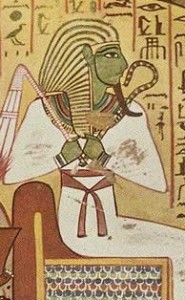 (Marduk‘s eldest son Ashur / Asar / Osiris, gods of Mesopotamian, & then Egypt)
(Marduk‘s eldest son Ashur / Asar / Osiris, gods of Mesopotamian, & then Egypt)
and here in the beautiful Amentet is the Kingdom of Osiris (Ashur).
On either side the river are the great shapes of the gods surrounding the form of Osiris himself.
Enthroned is he, appearing in splendor as king,
with the White Crown of the South Land and the Red Crown of the North Land upon his head.
Great is Osiris, god of the dead, for all who die come before him for judgment,
and their hearts are weighed in the balance against the feather of Truth.
His throne is set upon a running stream, clear and deep,
and from the waters rises a single lotus-blossom, the color of the sky at morning.
Upon the blossom stand the four Children of Horus,
they who assist Osiris at the Judgment, who protect the bodies of the dead.
To them belong the South and the North, the West and the East, and the four great goddesses are their protectors.
They stand upon the lotus-blossom and their faces are towards Osiris;
the first has the face of a man, the second the face of an ape,
the third the face of a jackal, and the fourth the face of a bird of prey.
This is the hour which evil-doers fear; by their own actions are they judged, and naught can avail them.
Heavy is the heart of the evil-doer and drags down the scale;
lower and lower it sinks till it reaches the jaws of Amemt, the Devourer of Hearts.
Then is the evil-doer driven forth into the thick darkness of the Duat,
to dwell with the abominable Apep and to fall at last into the Pits of Fire.
But some there are who have wrought righteousness upon earth; who have hurt no man by fraud or violence;
who have succored the widow, the orphan, and the shipwrecked mariner;
who have given food to the hungry and clothes to the naked;
who have not stirred up strife, nor caused the shedding of tears.
When these come to the Judgment of Osiris, and their hearts are put in the balance,
then is the feather of Truth the heavier.
The scale with the feather sinks down, and the scale with the heart rises up.
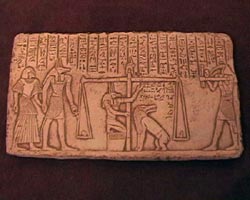 (scales of righteousness)
(scales of righteousness)
Then does Thoth, the twice-great, take the heart and place it again in the breast of the man,
and Horus takes him by the hand and leads him to the foot of the throne of Osiris
that he may dwell in the kingdom of Osiris for ever and for evermore.
And now only can he see the most pure and truly holy Osiris,
for “the souls of men are not able to participate of the divine nature
whilst they are encompassed about with bodies and passions…
When they are freed from these impediments and remove into those purer and unseen regions…
’tis then that this God becomes their Leader and King; upon him they wholly depend, still beholding without satiety,
and still ardently longing after that beauty, which ’tis not possible for man to express or think.
Slowly goes the Boat of Ra, passing through the Duat, to regions of thick darkness, of horror and dismay,
where the abominable Apep lies in wait for the coming of Ra, and where the Pits of Fire are prepared for the wicked.
Thus passes the third hour of the night, and the fourth hour is at hand.
Then the goddess of the third hour makes way for the goddess of the fourth hour,
and she calls aloud the name of the Guardian of the gate.
Flung wide are the portals, and the Boat of Ra passes through.
“Living one of forms” is the name of the fourth country of the Duat, and Sokar has dominion in this land.
Dreary is the waste of sand, limitless the desert, gloomy and sombre the landscape.
No blade of grass is seen, no tree, no herbage; naught grows, naught lives,
save monstrous many-headed serpents, gliding along the ground or creeping upon legs.
Terrible are they of aspect as they writhe and turn and hiss and roar;
they raise their hideous crests on high and hold their dusky wings outspread.
But their anger is not towards Ra, and he passes safely through their midst.
Engulfed is the great river and lost beneath the shifting sands, and where it ran is now a deep ravine.
The walls of rock rise high and steep, and ever the way winds and turns between the rocks.
Men call this place Re-stau, the Mouth of the Tomb.
Even in this gloomy desert Osiris has dominion;
Lord of Re-stau is he called, therefore none need fear when traversing the narrow path.
And now the Boat of Ra can no longer float upon the water,
but is changed into a great and mighty serpent with glittering scales.
At the prow is a serpent’s head with eyes watchful and fierce,
at the stern is a serpent’s head with poison-fangs prepared.
Over the sand it glides as a boat glides over the water.
Slowly goes the Boat of Ra, passing through the Duat, through regions of thick darkness, of horror and dismay,
to the place where Apep lies in wait for the coming of Ra.
Thus passes the fourth hour of the night, and the fifth hour is at hand.
Then the goddess of the fourth hour makes way for the goddess of the fifth hour,
and she calls aloud the name of the Guardian of the gate.
Flung wide are the portals, and the Boat of Ra passes through.
“Hidden” is the name of the fifth country of the Duat,
and in this dark and gloomy region dwells Sokar, its Lord and King, god of those who are buried.
Beside a turn of the winding way is his dwelling deep below the ground; above it rises a high mountain of sand.
Guarding it on either side are two sphinxes; lions are they in their bodies, with the faces of men;
and their claws are outstretched like the talons of a beast of prey.
In the midst lies a serpent with three heads, and between his wings stands Sokar
in the form of a man with the head of a hawk.
Savage and fierce as a hawk is Sokar, and terrible is the punishment he metes out to those who rebel against him.
Hard by his dwelling is a lake where the water boils and bubbles with heat as water boils in a pot.
Into the boiling lake are cast the rebels, and they cry to Ra for help, but Ra lies cold and lifeless,
waiting for the coming of Khepera, and their cries are unheeded while the Boat passes on its way.
On the farther wall of the ravine is a high and vaulted building, the home of Night and Darkness.
Two birds cling on either side, and round about it glides a two-headed serpent.
He lifts his savage heads, and his poison is ever ready to strike the rash intruder who should dare to try to pass.
Faithful is his watch, for in the home of Night and Darkness lives Khepera,
the great Soul of the universe, he whose emblem is the beetle, the god of resurrection.
In the form of a scarab he watches the coming of Ra,
and he flies upon the Boat and awaits there the time when he shall bring Life back to the god.
And now through the thick darkness along the narrow passage falls a gleam of light;
the Morning Star (Venus) stands by the gate to lead the Boat onwards;
for in the darkest of the night is a promise of the coming day.
Slowly goes the Boat of Ra, passing through the Duat, through regions of thick darkness, of terror and dismay,
to the place where the abominable Apep lies in wait for the coming of Ra.
Thus passes the fifth hour of the night, and the sixth hour is at hand.
Then the goddess of the fifth hour makes way for the goddess of the sixth hour,
and she calls aloud the name of the Guardian of the gate.
Flung wide are the portals, and the Boat of Ra passes through.
“Abyss of waters” is the name of the sixth country of the Duat, and Osiris has dominion over it,
Osiris, the great god, Lord of the city of Daddu, the living King,
Creator of men, of cattle, and of the green things which grow upon the earth,
Osiris, to whom all men bow in praise and adoration.
The river rises out of the sand again, and the Boat floats upon its waters,
and those who are in it rejoice, for the hours of the night are passing away.
On the banks of the river are the great shapes of the gods, mysterious and wonderful;
nine scepters of sovereignty stand there also, and a monstrous lion looms through the darkness,
faintly seen in the light which comes from the Boat of Ra.
Three shrines stand beside the river, and a serpent whose breath is flame guards each one.
Mystic and strange are the forms within the shrines, and to man it is not given to know the meaning of them;
in one is a human head, in another the wing of a bird, in the third the hind part of a lion.
Here also lives the great coiled serpent with five heads, and within his coils lies Khepera, god of resurrection.
On his head he places the scarab, beneath his feet is the sign of flesh;
thus does he send Life into the dead, and thus will he re-vivify Ra.
For this is the farthest point of the Duat, and beyond the gate lies the way to the sunrise.
Slowly goes the Boat of Ra, passing through the Duat, through regions of thick darkness, of horror and dismay,
where the abominable Apep lies in wait for the coming of Ra.
Thus passes the sixth hour of the night, and the seventh hour is at hand.
Then the goddess of the sixth hour makes way for the goddess of the seventh hour,
and she calls aloud the name of the Guardian of the gate.
Flung wide are the portals, and the Boat of Ra passes through.
“Secret cavern” is the name of the seventh country of the Duat.
Full of danger and peril is it, for the abominable Apep dwells in this land.
As a great and monstrous serpent does he appear and with wide-open mouth he swallows the waters of the river,
that the Boat may be wrecked and that Ra may perish.
Then would the earth belong to the powers of darkness, and evil and wickedness would overcome the gods.
But in the prow of the Boat stands Isis, the great enchantress, whose magic none can withstand;
Isis, the greatest of the goddesses, she who can raise the dead, and to whom all mankind pay love and reverence.
With arms outstretched, she recites the Words of Power; calling aloud across the dark river.
Over the body of Ra, the serpent Mehen casts his protecting coils, for now is the time of danger.
On a sandbank in the midst of the river lies the abominable Apep.
Four hundred and fifty cubits long is the sandbank;
the coils of Apep cover it so that naught can be seen but the river around him.
Loud does he hiss and roar, and the Duat is filled with the thunder of his voice,
yet Isis flinches not, nor does she cease her incantations and the magical movements of her hands.
Her spells prevail and the abominable Apep lies helpless on the sand.
Then Selk and Her-desuf leap from the Boat of Ra and bind him with cords,
and with sharp knives they pierce his flesh, hoping to destroy him.
But Apep is immortal, and every night will he await and attack the Boat of Ra.
Yet Selk and Her-desuf hold him fast while the Boat continues on its way,
past the great sandbanks, where he writhes and twists and struggles to get free,
but the cords are strong and the knives are sharp and his efforts are in vain.
Onward goes the Boat to the burial-places of the gods.
These stand beside the river; high mounds of sand are they, over each mound is a building,
and at each end the head of a man watches the passing of Ra.
Softly goes the Boat of Ra, passing through the Duat, moving through the darkness to the sunrise and the day.
Thus passes the seventh hour of the night, and the eighth hour is at hand.
Then the goddess of the seventh hour makes way for the goddess of the eighth hour,
and she calls aloud the name of the Guardian of the gate.
Flung wide are the portals, and the Boat of Ra passes through.
“Sarcophagus of the gods” is the name of the eighth country of the Duat, for here dwell the dead gods.
Dead and buried are they, embalmed and bandaged as men embalm and bandage the dead upon earth.
They cry aloud salutations to Ra as he passes, calling to him across the vast expanse,
but so far away are they that the sound of their voices is as the roaring of savage bulls,
as the cry of birds of prey, as the wail of mourners, as the murmur of bees.
Before the Boat go nine Followers of the Gods;
strange are their forms, mysterious and wonderful, like naught that is upon the earth.
In front of them march the four souls of Tatanen in the likeness of rams,
great and fierce, with horns wide-spreading and sharp-pointed.
The first is crowned with high upstanding plumes, the second with the Red crown of the North Land,
the third with the White crown of the South Land, the fourth with the glittering disk of the sun.
Ancient is Tatanen, dweller in Memphis, where the abode of Ptah (Enki) is on the south of the wall.
Softly goes the Boat of Ra, passing through the Duat, moving through the darkness to the sunrise and the day.
Thus passes the eighth hour of the night, and the ninth hour is at hand.
Then the goddess of the eighth hour makes way for the goddess of the ninth hour,
and she calls aloud the name of the Guardian of the gate.
Flung wide are the portals, and the Boat of Ra passes through.
“Procession of images” is the name of the ninth country of the Duat.
Full and strong runs the river, and the Boat is born forward upon the rushing stream.
Twelve star-gods guard the Boat, with paddles in their hands, ready to help the Boat in case of need.
Thick darkness broods not upon this land, for twelve great hooded snakes lie coiled upon the bank,
and the breath of their mouths is a flame of fire, gleaming upon the dark water and upon those who dwell in the Duat.
Three shallops float upon the sombre river; strange is the shape of these shallops, not like the boats of men;
and the shadowy forms within them are in the likeness of a cow, of a ram, and of the soul of a man.
From them the dwellers in this land receive the offerings which are made to them upon the earth.
Then the star-gods break into singing; and the twelve goddesses and the weaving gods
and the dwellers in this land chant the glory and honor of Ra,
praising the Lord of the Boat, the Maker of earth and of heaven.
With joy and singing they follow the appointed path.
Onward goes the Boat of Ra, passing through the Duat, traveling to the sunrise and the light of open day.
Thus passes the ninth hour of the night, and the tenth hour is at hand.
Then the goddess of the ninth hour makes way for the goddess of the tenth hour,
and she calls aloud the name of the Guardian of the gate.
Flung wide are the portals, and the Boat of Ra passes through.
“Abyss of waters, lofty of banks” is the name of the tenth country of the Duat, and the ruler is Ra.
The dwellers in this land come to meet their king as he passes by upon the swelling river.
Deep and full and strong runs the stream, and the Boat is born forward upon the rushing current.
Divine warriors armed with glittering weapons of war are a guard for their king;
light is on their faces like the light of the sun.
By the side of the river are four goddesses;
upon the darkness they cast beams of light, making bright the way of Ra upon the gloomy river.
Before the Boat of Ra moves the Star of Morning in the form of a double-headed serpent walking upon legs,
and upon his heads are the crowns of the South Land and the North Land;
between his coils is the great hawk of the sky;
Leader of Heaven is his name, for the stars of heaven follow him, but men call him Hesper and Lucifer also.
In a shallop on the stream is a snake, Life of the Earth is he called,
and he watches in the Duat against the enemies of Ra.
The greatest of all the countries of the Duat is this,
for in this realm of wonder and mystery Khepera joins himself to Ra, and Ra himself is created anew.
Yet the dead body of Ra remains in the Boat; but his soul is united to the soul of Khepera.
Onward goes the Boat of Ra, passing through the Duat, traveling to the sunrise and the light of open day.
Thus passes the tenth hour of the night and the eleventh hour is at hand.
Then the goddess of the tenth hour makes way for the goddess of the eleventh hour,
and she calls aloud the name of the Guardian of the gate.
Flung wide are the portals, and the Boat of Ra passes through.
“Mouth of the cavern” is the name of the eleventh country of the Duat,
and Ra is its ruler. Low has the river fallen and sluggishly it runs,
and the Boat is drawn onwards by the gods; not with cords do they tow it,
but with the body of the great serpent Mehen, the protector of Ra.
On the prow of the Boat is a fiery star, but its light is not redder than the strange and lurid glow
which fills this land; terrible and red is it and the sight of it is full of horror.
This is the region feared by evil-doers, for their punishment awaits them here.
Far and near are pits of fire; goddesses, whose breath is flame, guard the pits,
holding in their hands gleaming swords of fire.
With their knives do they torment the wicked and cast them into the pits of flame till they perish utterly.
Horus stands by and beholds their torments, for these are the enemies of Osiris and of Ra,
doers of evil upon the earth and blasphemers of the gods.
No help can come to them, no escape is possible; doomed are they by their own actions to the sword and fire.
And the smoke and flame of their torment rise up in the Duat.
On the far side of the river are the stars; Shedu is there in the fashion of a snake;
scarlet and crimson is he, and the stars which form his body are ten in number.
There also a shape is seen, mysterious and wonderful;
like a winged snake with legs does he appear, and between the wings is the shadowy likeness of a man.
Men call him Atmu, dweller in Heliopolis; ancient is Atmu, more ancient than Ra himself;
and he sends the sweet breezes of the North Wind upon the land of Egypt.
On either side of him the Eyes of Horus show dimly in the faint and lurid light.
And now springs up the breeze of morning; gentle is it and slight, but with it comes the promise of the day.
Onward goes the Boat of Ra, passing through the Duat, traveling to the sunrise and the light of open day.
Thus passes the eleventh hour, and the twelfth hour and the dawn are at hand
Then the goddess of the eleventh hour makes way for the goddess of the twelfth hour,
and she calls aloud the name of the Guardian of the gate.
Flung wide are the portals, and the Boat of Ra passes through.
“Darkness has fallen, and births shine forth” is the name of the twelfth country of the Duat.
On the prow of the Boat is the great scarab of Khepera,
ready to make the transformations of Ra where he reaches the end of the Duat.
Not like other lands is this twelfth region of the Duat, for it is enclosed in the body of a vast and monstrous serpent.
“Life of the Gods” is his name, and through this great and huge frame travels the Boat of Millions of Years.
Twelve of the worshipers of Ra seize the towing-ropes and drag the Boat onward,
and here in the body of the serpent is Ra transformed into Khepera and is alive again,
for now the journey through the Duat is near the end.
Standing by the mouth of the serpent are twelve goddesses;
to these the Worshipers of Ra yield the towing-ropes, and they draw the Boat to the eastern horizon of heaven.
And now the dead corpse of Ra is cast out of the Boat, as the husk is cast away when the grain is winnowed out,
for the soul and the life of Ra are in the scarab of Khepera, and the transformations of Ra are completed.
With shouting and singing, with joy and with gladness, the Boat of Ra passes out of the Duat.
Glorious is the Manzet Boat, speeding to the sunrise!
Wide, swing wide the portals, and usher in the day.
Between the sycamores of turquoise comes the Boat of Ra, and the mountain of Bakhu is flushed with light.
The serpent, guardian of the Great Green Waters,
beholds Ra in glory in the eastern horizon of heaven, and the rays glitter on his scales.
Glorious is the Manzet Boat, born upon the river, flashing in the splendor and the light of open day.
In the foam at the prow of the Boat sports the Abtu-fish, darting through the gleaming spray,
and the Ant-fish is seen in the whirlpool of turquoise.
From the earth rises up the sound of rejoicing, for all created things praise Ra at his rising.
Hail to thee, Ra, at thy rising; the night and the darkness are past.
At the dawn of the day thou shinest, the heavens are filled with thy light.
King of the Gods art thou, all glory and triumph are thine.
The Gods come as dogs to thy feet, rejoicing to greet thee at dawn.
Hail to thee Ra, at thy rising; at thy coming all men are glad.
In joy dost thou come in the morning, with glory thou rulest the world.
The stars of the heavens adore thee, the Gods of the earth exalt thee,
Lord of the Heavens art thou. Hail to thee, Ra, at thy rising!
None can express thy glory, Lord of all Wisdom and Truth.
The souls of the East attend thee, the souls of the West are thy servants, the North and the South adore thee.
Worshiped art thou, our Ruler, by those whom thou hast created,
Thou risest in heaven‘s horizon, thou causest mankind to rejoice.
Hail to thee, Ra, at thy rising; at thy rising in beauty,
O Ra.
